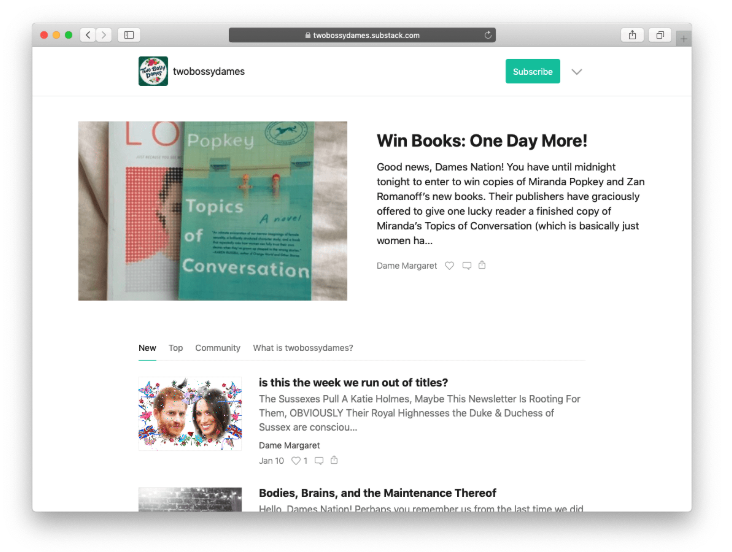Substack announced today that it has built support for multiple authors into its service. The company provides a publishing tool that blends blogs and email newsletters into a single entity, with a focus on subscription monetization.
The day’s updates also include a number of publisher-friendly tools, like shared access and homepage features closer to those of traditional websites than the linear timeline style that Substack has focused on so far.
The additions, which also include nice-to-haves like author pages for multi-person publications, mark a new level of maturity for Substack, a service that quickly attracted both authors and an audience after it launched. That early traction helped the company land an outsized — when compared to the size of its team — Series A that put $15.6 million into the business.
For users of the service, news of the funding was welcome. As was Substack’s disclosure at the time that the publications on its platform had attracted 50,000 paying subscribers. That figure was exciting, indicating that the company’s product might help writers of all sorts build a monetized audience, a holy grail for written creatives.
In light of today’s updates, TechCrunch asked Substack about the progress of its monetization, specifically curious about how many paid subscribers Substack publications had accreted. The company declined to share new numbers, with its co-founder and COO Hamish McKenzie instead saying that his team is “very happy with the growth [it has] seen over the past few months.”
In a company blog post accompanying today’s news, the firm noted “tens of thousands of paying subscribers,” implying that Substack has not yet doubled its former 50,000 person subscriber base. (Doing so would give Substack six-figures worth of subscribers. However, as it reached the 50,000 paid subscriber mark less than a year ago, it might be aggressive to expect such a rapid doubling.)
Newsletter, blog, website
Part of Substack’s initial success came from its intelligent blending of blogs and newsletters. Anyone who wanted to build one or the other got both, in a format that worked for each; bloggers could send email, and the email-focused also got a home on the internet. That the product came stapled to monetization tools made it all the more attractive.
Today’s updates help add a new form to the Substack mix: Websites. Here’s what a new Substack website can look like:

The ability to pin posts to the top of publications, the addition of photo bylines, and other tools mean that users can now do much more with the Substack publications. The company will now have to tread the line between the power of simplicity, and simply empowering its power users.
The company’s model appears to be working. Traffic to the larger Substack service has risen in recent months, according to analytics service Alexa. Substack was ranked among the 13,000th most visited global site in October of last year, according to the platform. It’s now in the 11,000s. With media companies like The Dispatch hatching on Substack, and with today’s updates, expect that number to continue to fall.
Substack is a bet that readers will pay for the written work that they care about. It’s a good wager. And better tools will tilt the odds more in its favor.
Now we can simply count down until Substack announces 100,000 paid subscribers.
